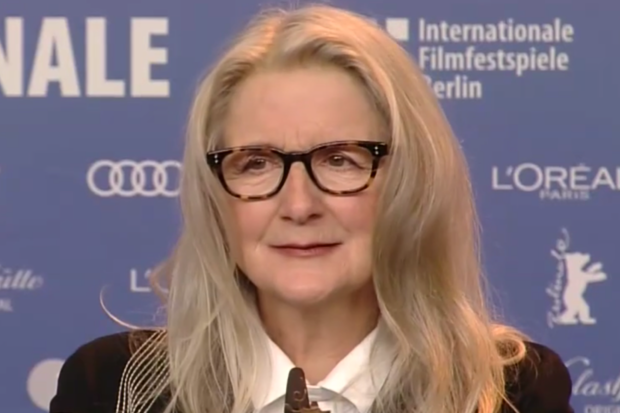Sally Potter • Director
“I wanted to go deep into something peculiarly human in a short space of time”
- BERLIN 2017: British filmmaker Sally Potter talks about The Party, a comedy that she unveiled in competition at Berlin

Back in competition at the Berlinale, where she presented Rage [+see also:
film review
trailer
film profile] in 2009, British director Sally Potter spoke to the international press about her new film, The Party [+see also:
film review
trailer
Q&A: Sally Potter
film profile]. For the occasion, she was accompanied by her actors Kristin Scott Thomas, Cillian Murphy, Bruno Ganz, Timothy Spall and Patricia Clarkson, plus her producers Kurban Kassam and Christopher Sheppard.
The film feels like it could easily be a stage play. What were your initial intentions?
Sally Potter: It was always conceived as a film, absolutely. However, it builds on some of the building blocks of the very long roots of cinema, which go back through a theatrical tradition, something that’s orientated around performance, and the development of character and story. I wanted to find a way of making a comedy first of all, but also something that felt purely cinematic, something you could only see and feel through the lens; I didn’t want something stagey, but it had to have the qualities where characters could fully reveal themselves in a very compressed space of time. That constraint of having it all in one place was peculiarly freeing, as it meant that we could concentrate on what was important and not waste loads of time on stuff that wasn’t particularly vital. And it’s kind of an antidote to massive-budget films with millions of special effects, which in the end create a kind of numbing effect. It’s always “More, more, I want more"; I wanted to get the feeling of taking all that away and finding something peculiarly human and going as deep as we could in a short space of time – and laugh.
At what stage was the decision made to make the film in black and white?
Fairly early on. I felt that black and white gave this incredible space for emotional colour because we’re not distracted by apparent realism. It opens up other spaces in the brain. And many of my favourite films ever made were in black and white, so it’s nice to feel that it’s part of that lineage. Somehow, it’s magical the fact that the brain can see things in a different way, but in an absolutely real way, in the abstract world of light and dark. And as the story was about extremes, I made the decision quite early on.
How did you work with your cinematographer?
Aleksei Rodionov, who is Russian, is a wonderful cinematographer whom I had the great pleasure to work with for the first time many years ago on Orlando. At that time, I discovered that he was used to making things happen with a piece of string, a rubber band and very good eyesight. It wasn’t about having a huge technological advantage; it was having amazing imagination and the ability to do a lot with a little. He brings a deeply script- and character-orientated way of shooting. It’s never an aesthetic for its own sake; it’s a very deep form of looking and listening, within the Russian tradition of lighting the face to bring out the dramatic qualities of the scene.
Where do you get your immense talent for writing dialogues?
I think it’s a matter of carefully listening to the way that people speak, and particularly the things that they don’t say, things that people wished they didn’t think, or feel they can’t say.
Had you intended to make a political film?
In one sense, the entire film is a political comedy, but it’s a light and loving comedy, a light and loving look at the state of England, a kind of broken England. But the film is more of a meditation on the notion that politics is everywhere, including in human relations. The most important thing is the language of truth-telling and the healing power of love in overcoming tragedy, but watch out if you’ve got a gun in the laundry basket.
(Translated from French)
Did you enjoy reading this article? Please subscribe to our newsletter to receive more stories like this directly in your inbox.















